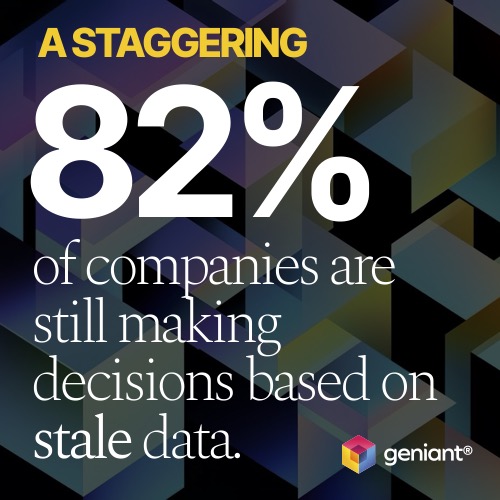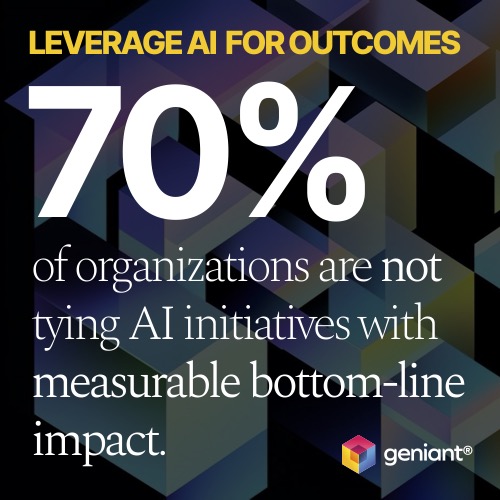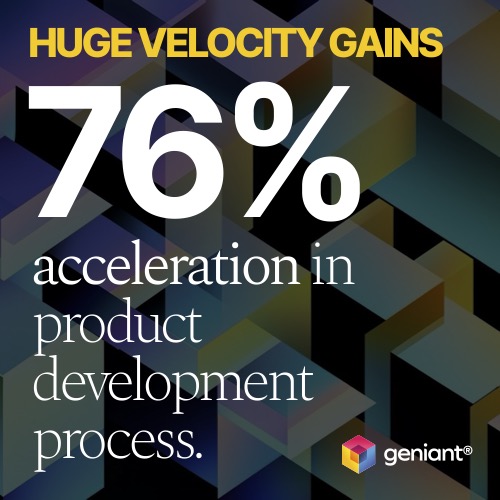

Turning AI Buzz into Real Business Results with a Proven Strategy
While buzzwords and futuristic promises of AI flood the media, it seems like everyone is talking about AI, but many companies are left wondering: what does it all mean for us? At geniant, we believe the true power of AI lies not in the technology itself, but in the tangible business impact it can deliver. At geniant, we don’t talk about AI. We talk about business outcomes, and the best business outcomes are the result of a tested, proven, strategic approach.
In the race to adopt artificial intelligence, companies are eager to harness its transformative power, but they often overlook critical factors that can make or break their AI initiatives. At geniant, we talk about areas where companies frequently fall short in their AI strategies, and what every AI project should take into consideration for the most impactful outcomes.
At geniant, we don’t talk about AI. This is what we talk about at geniant.

At the heart of any successful AI implementation lies high-quality, clean data. Yet, surprisingly, many organizations underestimate the critical nature of this foundation. According to a survey by Alation, 87% of data professionals believe dirty data is a primary reason for AI project failures. Despite this awareness, a staggering 82% of companies are still making decisions based on stale data. The repercussions are significant: IBM estimates that poor data quality costs the US economy around $3.1 trillion annually.
Many companies dive into AI enthusiastically without a clear, overarching strategy. A 2023 study by Boston Consulting Group found that only 16% of companies are scaling AI across their organization. This piecemeal approach (we call them silos, but we can get into that later) often leads to isolated AI projects that fail to deliver significant value. Deloitte's State of AI in the Enterprise report reveals that 95% of companies cite barriers to AI adoption, with lack of AI strategy ranking among the top challenges. We help clients start with business outcomes in mind through the use of our proven geniant | illuminate process, which we will explain in a bit.

Too often, companies pursue AI projects without clear alignment to overarching business goals. A McKinsey Global Survey found that only 30% of organizations are seeing significant bottom-line impact from AI. This misalignment can result in AI projects that, while technologically impressive, fail to deliver tangible business value. Successful AI adoption requires a strategic approach that ties AI initiatives directly to key performance indicators and business outcomes.
Aligning with business objectives is core to everything we do at geniant. By understanding the employee and customer journey, geniant is able to bring the right solutions, which are both more comprehensive and outcome oriented. This approach often results in meaningful transformation.
geniant VP of Experience Research and Insights, Kelly Moran, highlights their proven approach, "geniant | illuminate is the approach we use across our three pillars of Space, Digital, and People. While every project is unique, there is a reliable set of methods and activities we can leverage to ensure a successful engagement. There are over 200 activities in the illuminate methodology. We don’t use every activity every time, and there’s often room for a little innovation and creativity to try something new, but having a curated set of things we can rely on gives us a strong foundation."

As AI systems process vast amounts of data, robust data governance and security measures are crucial. Many organizations fall short in this area. A 2023 survey by ISACA found that only 50% of organizations have a comprehensive data governance program in place. This oversight can lead to data breaches, regulatory non-compliance, and loss of customer trust. The cost of such failures is significant; IBM's Cost of a Data Breach Report 2023 reveals that the global average cost of a data breach has reached $4.45 million. Just to reiterate, that is the average.
AI models are not "set it and forget it" solutions. They require ongoing monitoring, updating, and retraining to maintain accuracy and relevance. Yet, many companies overlook this crucial aspect of AI implementation. A study by O'Reilly found that 25% of organizations cite difficulties in maintaining and updating AI models as a significant challenge. This neglect can lead to model drift and deteriorating performance over time. Gartner predicts that by 2025, 60% of organizations will have implemented dedicated processes to monitor and retrain their AI models to ensure continued accuracy.
The AI talent gap remains a significant hurdle for many organizations. A 2023 IBM report indicates that 39% of companies cite limited AI expertise or knowledge as a barrier to AI adoption. This shortage is compounded by the fact that demand for AI and machine learning specialists is projected to grow by 71% over the next five years, according to the World Economic Forum. Companies often overlook the need to invest in upskilling their existing workforce or attracting specialized AI talent. Without this, companies make it more difficult to fully realize the potential AI has to offer.
Many companies overlook ethical considerations and bias mitigation in their AI implementations. A 2023 KPMG survey found that only 35% of business leaders say their organization has an AI ethics policy in place. This oversight can lead to biased outcomes and erosion of trust. In fact, a study by Gartner predicts that by 2025, 70% of organizations will have bias mitigation and model interpretability as a key requirement for AI projects. Our approach to leveraging AI is rooted in ensuring clean data with a strict, proven process that removes bias and produces reliable outcomes.
Many companies underestimate the infrastructure requirements for successful AI deployment. A 2023 O'Reilly survey revealed that 26% of organizations cited lack of necessary infrastructure as a significant barrier to AI adoption. This includes not just hardware, but also software platforms and cloud services. According to IDC, worldwide spending on AI-centric systems is expected to reach $154 billion in 2023, underlining the substantial investment required for robust AI infrastructure. Recently, Amazon, Google, and Microsoft announced massive investment in nuclear power to operate their AI efforts.
Implementing AI often requires significant changes to business processes and employee roles. However, many organizations underestimate the importance of change management in their AI initiatives. A PwC study found that 85% of AI projects fail due to poor change management and lack of collaboration between IT and business teams. Effective AI adoption necessitates a holistic approach that considers the human elements of technological change. geniant’s proven processes ensure our clients are set up for long-term benefits, not just designed with a short term solution in mind.
As AI systems increasingly influence critical decisions, the ability to explain how these systems arrive at their conclusions becomes paramount. However, many companies overlook the importance of explainable AI (XAI). A survey by FICO found that 65% of companies are unable to explain how specific AI model decisions or predictions are made. This lack of transparency can lead to regulatory issues, erode trust, and hinder AI adoption in sensitive areas. In response to this challenge, Gartner predicts that by 2025, 30% of government and large enterprise contracts for AI products and services will require the use of explainable and ethical AI.
While AI offers immense potential, successful implementation requires a comprehensive approach that addresses these often-overlooked aspects. From ensuring data quality and ethical considerations to aligning AI initiatives with business objectives and maintaining models over time, companies must take a holistic view of their AI strategy. We believe failing to realize the true potential of AI is a tremendous miss for companies. Those who get it right from the start will create significant advantages for their business.
With our proven processes and tenured subject matter experts, geniant is delivering innovation by embracing a tested methodology that is customer-centric, front-loaded to solve the right problems, responsive, and action-oriented.
You need holistic solutions for today's complex challenges.
geniant’s proven process and methodology — along with our expertise — works together to solve your space, people, and technology challenges.